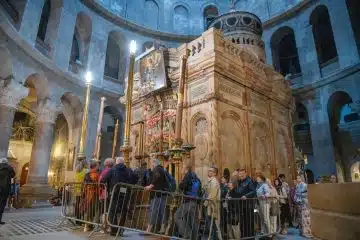Sunday Scripture: Who is the Holy Spirit?
May 29, 2011
By Terrance Callan
Sixth Sunday of Easter: Acts 8: 5-8, 14-17; 1 Peter 3:15-18; John 14:15-2 1.
We believe that there are three persons in one God, the Father, Son and Holy Spirit. We have a fairly clear understanding of God the Father, and an even clearer understanding of the Son, but the Holy Spirit is mysterious to us.
Perhaps this is because the Holy Spirit is in some sense more intimately part of our lives than the Father and the Son. The Holy Spirit may be too close to us to be seen clearly.
Today’s reading from the First Letter of Peter uncovers some of the mystery of the Holy Spirit. The main point of this reading is to argue that Christians should lead virtuous lives so that any suffering they undergo is for good deeds rather than evil ones. In doing this we will conform to the example of Jesus, a just man who died for the unjust.
However, in making this argument the reading says about Jesus that “put to death in the flesh, He was brought to life in the spirit.” The resurrection of Jesus was not a return to the life that Jesus had before His crucifixion, but entry into a new life characterized by the Holy Spirit. It is this new life of the Holy Spirit that we now share with Jesus, and that we hope one day to share with Him fully.
The reading from the Acts of the Apostles tells part of the story of the evangelization of Samaria. Philip, one of the seven who had been appointed to take charge of the daily distribution of food in the Jerusalem community, preached the Gospel in Samaria. Many believed and were baptized. When the apostles in Jerusalem heard about this, they sent Peter and John to Samaria. Peter and John imposed hands on the Samaritan Christians, and they received the Holy Spirit.
This story makes it clear that we need to receive the Holy Spirit in order to be full Christians. It might also suggest that baptism and reception of the Holy Spirit are separate events. However, the story probably implies the opposite. Elsewhere the Acts of the Apostles connects baptism and reception of the Spirit closely. Here the point is probably that precisely because the Samaritans have been baptized, they must receive the Spirit.
The reading from the Gospel of John speaks about the role of the Spirit most fully. This is another excerpt from Jesus’ long farewell to His disciples at the Last Supper in the Gospel of John. Here Jesus consoles His disciples by saying that after He leaves them He will ask the Father to send them the Spirit of truth as another Paraclete, or Advocate, i.e., another in place of Jesus.
But Jesus goes on to describe the Spirit and himself in very similar terms. The world will not see the Spirit or Jesus, but Jesus’ disciples will see or recognize both. This suggests that the Spirit is actually Jesus’ continuing presence among His followers after His death and resurrection. It is the gift of the Spirit that makes it possible for Jesus’ followers to know that “I am in my Father, and you are in me, and I in you.”
Reception of the Holy Spirit is essential to Christian life because it is the means by which we are united with Jesus in His resurrection life and, through Jesus, with the Father.
Callan is a faculty member at the Athenaeum of Ohio.













